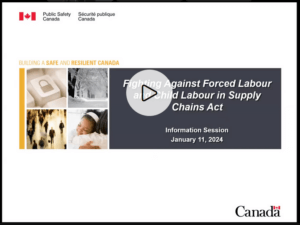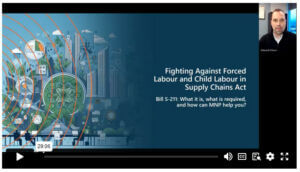Fighting Forced Labour and Child Labour in Canadian Supply Chains
 Bill S-211: Fighting Forced Labour and Child Labour in Canadian Supply Chains
Bill S-211: Fighting Forced Labour and Child Labour in Canadian Supply Chains
May 3, 2024 – Additional guidance for potentially affected members
There continues to be a large degree of uncertainty around what constitutes a reportable entity for Bill S-211, including on the definition of “goods.”
Despite repeated requests from CHBA and engagement with the Minister’s office, Public Safety Canada has not published an interpretation on Bill S-211 regarding the compliance obligations of home builders that meet the size thresholds for entities— the criteria for members not listed on a stock exchange in Canada. CHBA has sought the interpretation that the sale of new real property was distinctly different than the sale of goods, as defined by Bill S-211. This is the understanding of “goods” versus “real property” in the ordinary sense of the wording in common law. Public Safety Canada’s regulatory compliance guidelines state that it is the responsibility of the entity to assess how the Act applies to their specific circumstances. Guidance has been updated to state that if an entity is unsure whether they meet any of the prescribed application criteria, they are encouraged to seek advice from their legal counsel.
CHBA’s recommendation for members deciding on if they need to comply with Bill S-211 is to seek legal counsel’s opinion that the sale of new real property and the sale of goods are distinctly different, even in the ordinary sense of the wording. On this basis, the agreement of counsel would allow a corporate entity to self-identify as not a reportable entity. If legal counsel believes that there are grounds to treat the sale of new real property as the sale of a good, your business will need to prepare and file a report that complies with the requirements.
Builders should also assess if they are directly involved with the importation of goods, without the use of a 3rd party importer. Direct importation, beyond “very minor dealings,” may also require an entity to file a report. Given that businesses were given short notice about these regulations, Public Safety Canada accepts that reports will not have actions to report on. Public Safety Canada has stated that it “understands given the recent coming into force of the supply chains act that entities may not have measures to report on, for some or all the requirements. You are able to state that in your report and you would still comply with the act.” This was stated in the January Webinar (password: Dt3JWQeG) at the 18:40 minute mark. Public Safety Canada went on to guide that “entities may also indicate that no measures have been taken to remediate forced labour or child labour risks in their activities and supply chains, if that is the case. They can indicate this in their questionnaire and their report and doing so would be sufficient to meeting the entities legal obligations.”
CHBA takes this to mean that obligated builders would still need to report on “Requirement (a) – Structure, activities and supply chains” but the subsequent requirements (b) through to (g) could state that no action has been taken due to the late coming into force and reporting guidance, if that is the case.
CHBA has, and will continue, to work with government officials and association partners on clearer guidance, alternative approaches and future consultation on further legislation.
 December 21, 2023 – Guidelines Released, Informational Briefing on January 11
December 21, 2023 – Guidelines Released, Informational Briefing on January 11
Public Safety Canada’s informational webinar on Jan 11 – Watch Recording Here (password: Dt3JWQeG)
The federal government has now released long-awaited guidelines for the significant regulatory reporting requirements contained in Bill S-211, An Act to enact the Fighting Against Forced Labour and Child Labour in Supply Chains Act and to amend the Customs Tariff (the Act). The Act’s aim is to push businesses in Canada to reduce their exposure to supply chains that utilize forced labour or child labour.
For information on CHBA’s advocacy to eliminate or at least reduce the red-tape burden on the residential construction industry, see below.
Given the guidelines, it is expected that many builders and developers will now have reporting requirements. To be subject to the Act, an entity is defined as a corporation or a trust, partnership or other unincorporated organization that either:
- is listed on a stock exchange in Canada; or
- has a place of business in Canada, does business in Canada or has assets in Canada and that, based on its consolidated financial statements, and meets at least two of the following conditions for at least one of its two most recent financial years:
i. it has at least $20 million in assets,
ii. it has generated at least $40 million in revenue, and
iii. it employs an average of at least 250 employees.
If your business meets the threshold definitions of an entity and a reportable entity, your business must now:
- produce an annual report that
- outlines your business’s potential exposure risk to forced labour and child labour in your supply chains
outlines your business’s actions taken over the course of the past year to prevent and reduce risks of forced labour and child labour - provides information on seven other main topics
- annually submit that report to Public Safety Canada
- complete an online questionnaire
- annually make that report available to the public on your website
- outlines your business’s potential exposure risk to forced labour and child labour in your supply chains
 The first annual report, which must report on activities undertaken in 2023, is due for submission by May 31st, 2024, and has a length limit of 10 pages.
The first annual report, which must report on activities undertaken in 2023, is due for submission by May 31st, 2024, and has a length limit of 10 pages.
Affected members are encouraged to watch the recording of Public Safety Canada’s informational webinar (password: Dt3JWQeG), which was delivered on January 11th, 2024. CHBA will provide a summary of the technical briefing on this page for future reference. For affected members, MNP’s Environmental, Social and Governance (ESG) experts can provide compliance advisory services.
CHBA Advocacy
This legislation was meant to apply to large companies (e.g. over 250 employees) and not smaller ones. However, because of the high value of buildings, many residential construction industry companies, even though small, have high revenue and assets, making the fall under the act and causing a reporting duty that is misaligned with their capacity. CHBA accordingly engaged with politicians and officials to seek an exemption for our industry. For a more detailed account of CHBA’s advocacy (e.g. meeting with Minister LeBlanc’s office), see below.
CHBA does note that some of its raised concerns and actions to reduce the impact of these regulations on the home construction industry (see previous updates below) were addressed in the guidelines, including an exemption from having to report on commercially sensitive information. However, CHBA continues to contend that businesses will not have actions to report on for the 2023 report because they were previously not obligated to take action on forced or child labour risks. Given the year-end release of the formal regulation guidelines, CHBA calls for soft enforcement of the Act in its inaugural year after coming into force. CHBA will continue to engage with Public Safety Canada officials to attempt to lessen the burden on industry.
December 12, 2023
CHBA met with members of Minister LeBlanc’s office at the end of November to seek an interpretation that would exempt homebuilders and developers from Bill S-211’s reporting requirements and to request any additional guidance on compliance details. The Minister’s staff understood the concern of all those affected about the lack of specific guidance up to this point. The advisors from Minister LeBlanc’s office assured CHBA that technical briefings around expectations for the annual reporting requirements will be made available “very soon.” CHBA expressed the inappropriateness of the application to this industry and of the delay in releasing details. CHBA understands the concern of affected members and will distribute these technical briefings as soon as they are available, and will be seeking to focus on any guidance on how reports should handle commercially sensitive information.
In our request for a clarification on the criteria for a reportable entity, where we were seeking an exemption because houses and buildings are not typically considered “goods,” Public Safety Canada stated that the definition of goods “refers to goods that are the subject of trade and commerce, understood in the ordinary sense of the word which would cover the construction sector, as long as what is being produced meets the definition of goods.” Unfortunately, this interpretation means that home builders and developers fit the criteria of a reportable entity as they would meet Section 9 (a) of Bill S-211 which states “this part applies to any entity producing, selling or distributing goods in Canada or elsewhere.”
While Public Safety intend to follow through with the current coming-into-force date of January 1, 2024, the Minister’s staff stated that the regulation will be initially implemented with a “do no harm” approach. The inaugural 2024 report filing process will be used as a learning process for both Public Safety Canada and obligated reportable entities.
CHBA has expressed to the government that Bill S-211 is one of several regulations introduced recently that were broad in scope and will have the unintended consequence of bogging down home construction. Specific to Bill S-211, builders do not have control around ensuring building material supply chains are free of exploitative labour. The information contained in their report will only be as good as the information provided to them by their building suppliers. The importation of goods produced with exploitative labour is already illegal under the Criminal Code. In addition, there has been no framework that provides an exemption from commercially sensitive information in these public reports. Framing our views in this way, the issue with Bill S-211, and other regulations, was raised in a letter addressed to the Prime Minister as well as the various Ministers responsible for Revenue, Housing, and Public Safety.
October 30, 2023
The following letter was sent to Public Safety Minister LeBlanc. This letter requests an interpretation of CHBA’s request for home builders to be exempted as a reportable entity under Bill S-211’s regulations. Should an exemption not be granted, CHBA is calling for a one-year deferral of the January 1,2024 coming-into-force date.
October 19, 2023
The purpose of this page is to update members on the actions of the Association and the responses from the Government of Canada thus far, regarding measures introduced through Bill S-211 An Act to enact the Fighting Against Forced Labour and Child Labour in Supply Chains Act and to amend the Customs Tariff (the Act). CHBA supports policies that help eradicate modern slavery and child labour; however, the Association is concerned about potential misplaced burden on industry and the production of much needed housing supply, especially given the lack of details on the intake process and regulatory compliance criteria ahead of the January 1, 2024 coming-into-force date.
Background
The purpose of the Act is related to the Government of Canada’s international commitment to combat forced labour and child labour. The Act attempts to achieve this by mandating reporting obligations on any Canadian-linked “entity” that:
- Produces, sells, or distributes goods anywhere (in Canada or elsewhere)
Or - Imports goods into Canada
Or - Controls an entity that engages in 1 or 2.
Within the Act, the term “entity” is defined as a corporation, trust, partnership or other unincorporated organization that:
- is listed on a stock exchange in Canada
Or - has a place of business in Canada, does business in Canada or has assets in Canada and meets at least two of the three following conditions in at least one of its two more recent financial years:
- Has at least $20 million in assets
- Has generated at least $40 million in revenue
- Employs an average of at least 250 employees
The Act would require an applicable entity to submit an annual report to the Minister of Public Safety on or before May 31st of each year—beginning in 2024. This report will need to provide information on the structure of the entity’s supply chain and steps it has taken to identify and reduce the risk of forced or child labour being used at any point along the organization’s supply chain. Report requirements also include reporting on the training the entity has provided to its employees on forced and child labour. In accordance with the Act, each annual report will need to be published “prominently” on the entity’s website and will also be hosted on the Department of Public Safety and Emergency Preparedness website.
Actions taken by CHBA
CHBA believes that the construction of a home is distinctly different than the manufacturing of a “good.” We have asked for an interpretation from Public Safety Canada on if it views new home construction as a “good.” We assert that within Statistics Canada’s GDP measures, homebuilding activity/output is recorded within business investment (not household consumption of goods) or the construction industry (not the manufacturing industry). In combination with the government looking to prioritise new housing supply, it is our hope that all home builder and developer members that do not engage directly in importing goods into Canada would be exempt from reporting obligations. Unfortunately, given the changing of staff post-cabinet shuffle, we have not been able to get an interpretation from the Ministry yet—the entire process has lacked timely information for all.
In correspondence with an official with the Office of the Minister of Public Safety, no details regarding regulatory compliance or timelines for the release of these details can be shared at this time. We share the frustration expressed by our members on this point.
CHBA objects to the lack of any additional details to date regarding compliance criteria and is also continuing to seek a timeline for the release of the finalized details on what would constitute acceptable compliance. Since CHBA was first made aware of this issue from members, CHBA has been keeping in contact with the Canadian Chamber of Commerce as well as MNP’s Environmental, Social and Governance (ESG) practice, who also have concerns; they have also confirmed that the federal government has not divulged any other additional details about the Act beyond what is publicly available.
Along with many others, CHBA continues to seek a deferral on the current coming-into-force date of January 1st, 2024; the likelihood of this has not been communicated to CHBA. CHBA has been given assurances that additional government guidance and a new reporting tool to help businesses with compliance will be made available (which would include the interpretation on housing not being a good, if that were to come to fruition).
CHBA’s Next Steps
We will continue to seek an interpretation on the applicability of Bill S-211 to the home construction industry, as again, we do not view home construction as a good. CHBA was successful in gaining a favourable interpretation of the regulations on the Underused Housing Tax Act earlier this year and is using this strategy to seek a partial exemption for members from these new reporting rules as well.
CHBA continues to seek a deferral from Public Safety Minister Dominic LeBlanc on the coming-into-force date of Bill S-211. Given that there are no details ahead of the coming-into-force date, all industries and obligated entities need time to review the reporting format to ensure they are compliant. It remains incumbent on the federal government to provide advice well ahead of the coming-into-force date on what the report filing should contain.
CHBA is also emphasizing the need to ensure that the regulations are implemented correctly. CHBA wants assurances that products and materials used in home construction are not mistakenly barred from being imported into Canada due to a flaw in the regulation’s design.
CHBA continues to push for the release of the details surrounding the reporting requirements, as well as the interpretation CHBA is seeking. As greater clarity is given on the expectations of how businesses can certify their supply chains as low risk or free of forced or child labour, CHBA plans to support its members with additional guidance. Once we have details, we will create an informational guide for members obligated to comply with these regulations. This will be similar to the guide and webinar created for members obligated to comply with FINTRAC regulations.
